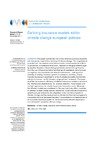The paper outlines the role of insurance as a political economic tool that can be used to face the issue of climate change. The magnitude of potential loss, the adverse social and economic consequences for millions of people and considerable fiscal strain imposed on the government budget by weather disasters indicate that governments can benefit significantly from the use of insurance instrument that would seamlessly not only cover damage but also incentivate risk reduction behaviours. Looking at the diversity of existing insurance systems in European countries, natural hazards insurance is examined in terms of private and public involvement, taking into account the EU climate change policies framework. The paper analyses the economic efficiency of different insurance models in relation to the informational imperfections, i.e. adverse selection, moral hazard, and market imperfection, i.e. charity hazard and transaction costs. Moreover, the different models are considered for the way they likely affect incentives to address climate change seeking mechanism to facilitate the mitigation of greenhouse gas emissions, the adaptation to the inevitable impacts of climate change, and the development of climate risk financial management. Conclusive remarks are presented about the possible future development of an European insurance system to find an economic efficient response to natural hazards caused by climate change.
- issn: K32, L51, P16, Q28
CMCC Divisions
Authors
- Keywords: climate change, environmental policy choice, insurance


